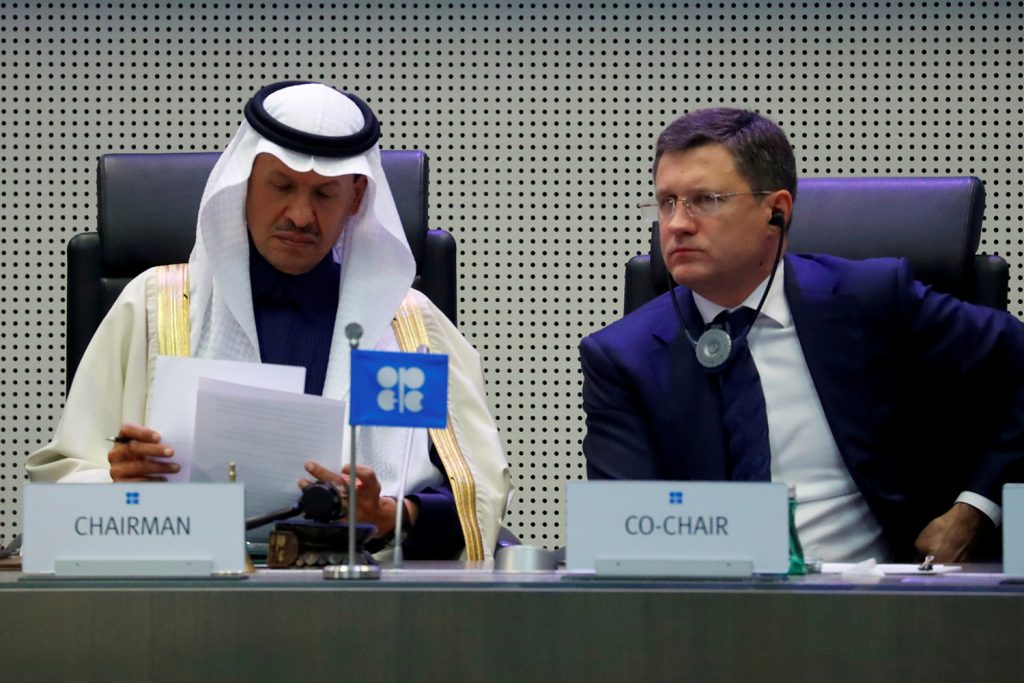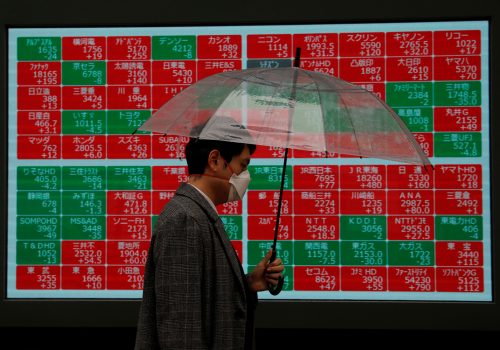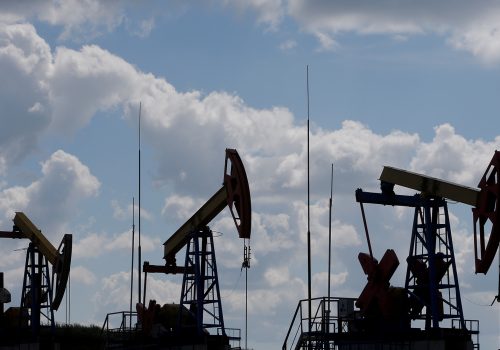Global oil prices crashed early on March 9 after a dramatic rift opened between two of the world’s most important oil producers over how to respond to the potential effects of the coronavirus outbreak. A meeting between the Organization of the Petroleum Exporting Countries (OPEC) and ten other oil producing countries (known as OPEC+) ended on March 6 as Saudi Arabia failed to convince Russia to accept a more than 1 million barrels per day (bpd) cut in production to offset falling demand to due to slowing economic activity during the coronavirus emergency.
In response to Moscow’s refusal to sign up to the cut, Riyadh cut its official selling price for April down to $8, from a previous $14, in an effort to pressure Russia, as well as threatening to raise, rather than cut, its production levels. Both countries are placing hope in their ability to weather a hopefully temporary period of low oil prices, as their economies remain heavily dependent on the export of oil products. As of opening of trading on March 9, Brent crude oil had fallen to nearly $31, and international financial markets were down significantly over fears about a continued crash in oil prices.
Atlantic Council experts respond to the Russia-Saudi Arabia oil rift and the road ahead for the oil market:
Randolph Bell, director of the Atlantic Council’s Global Energy Center and Richard Morningstar chair for global energy security:
“While Russia’s decision last week not to support OPEC’s proposal for a production cut and the subsequent oil price war—which as of publishing has pushed Brent crude down more than 9 percent—is surely part of the larger story of the economic impacts of the coronavirus outbreak, it is actually better understood as a geopolitical story about how US energy production growth has strengthened the United States’ international posture, which in turn has reshaped a number of global relationships. Russia’s decision, in fact, will likely further advance US interests and strengthen its hand.
“Of course, the coronavirus-induced drop in global oil prices set the scene for the collapse of the OPEC+ agreement last week, but the impact of the virus was just one of many potential events which could have pushed down oil prices and triggered the breakup of the group, which seems to have been far more fragile than previously thought.
“Though domestic factors in Russia contributed to the decision, in particular Russian producers’ longstanding desire to produce more, it appears that Russia’s main motivation for not going along with the OPEC plan was to punish US shale producers in retaliation for US sanctions on both the Nord Stream 2 pipeline and Rosneft for its work in Venezuela. The Russians also appear unhappy with the level of Saudi investment in Russia, which seems to have been an unwritten part of the OPEC+ arrangement.
“Both the (previously) growing Russia-Saudi relationship and the United States’ freedom to impose energy-related sanctions are a direct result of the growth of US shale production. On the latter, the United States has had the freedom to remove oil from the global market via sanctions without significant fear of driving up prices and hurting the US economy. On the former, US production growth pushed Saudi Arabia and Russia together as the two countries saw value in working together to help manage an oil market awash with barrels.
“From a US perspective, Russia’s growing relationship with Saudi Arabia was one of the few negative outcomes of its oil production growth. That relationship is now in tatters—at least for the time being—and as oil price drops, the United States has even more geopolitical freedom to act. US companies will feel pain, but shale has proven to be remarkably resilient. It seems very likely that this decision will backfire for Russia and further advance US goals.”
John Herbst, director of the Atlantic Council’s Eurasia Center:
“The current oil production war between Riyadh and Moscow has both an immediate and longer-term origin. The immediate cause is short-term thinking in Moscow. The Kremlin decided not to join the Saudi-driven OPEC in production cuts in order to optimize revenue. Why? Russia’s economy has been stagnant since 2013—well before sanctions and when a barrel of oil was still over $100—and has barely grown since then. After gross domestic product (GDP) fell in 2015, growth has been anemic: .329% in 2016 and only 2.26% in 2018. The standard of living in Russia has done far worse than GDP, with implications for President Vladimir Putin’s political popularity. In the 2000s and before, Russia was a free rider on OPEC policies. Over the past half-decade or so, the Kremlin’s outreach to Saudi Arabia and OPEC included some synchronization of oil production. So this latest turn can be explained as a return to traditional Russian policy; but it is revenue driven.
“The stories that Putin’s objective in refusing production cuts was to punish the United States and shale producers in response to the effective US sanctions on Nord Stream II are pure spin. Yes, falling oil prices may hurt shale producers, but they are a boon to the US economy overall. American ingenuity in developing shale production had put it in an enviable position whatever happens in the oil market.
“But a production war takes at least two, and that brings us back to the longer-term origins of the current standoff. As OPEC’s swing producer, Saudi Arabia has a long history of enacting production cuts when global demand for oil is weak to prop up prices—so long as its partners are also willing to limit production. So Riyadh’s reaction when Moscow decided to free ride was predictable. And Moscow’s desire to maximize revenue by refusing production cuts will likely prove to be a failure.”
Reed Blakemore, deputy director in the Atlantic Council’s Global Energy Center:
“At the start of last week, it was always a possibility that OPEC and non-OPEC members would fail to reach an agreement to further cut production. That the meeting would devolve into an outright collapse of OPEC+ and weekend price war builds an additional shock into an already uncertain economic forecast and will have a geopolitical ripple effect that will be felt in subtle, yet deeply important ways.
“There are two trends worth watching here. First is where the Russia/Saudi relationship goes following the collapse of an oil partnership which was at the center of a broader geopolitical alignment that had touchpoints across the Middle East and domestically in Russia. Whether that alignment can survive the effect of an oil price war—even if mutually waged with the intent to push out US shale over the long term—remains to be seen. Both Riyadh and Moscow are well-positioned in a low oil price environment, but both also must manage a host of other policy uncertainties that might challenge how long either can keep the taps running at full tilt, namely Saudi Arabia’s relationship with the United States and Russia’s steady political transition to a post-Putin world.
“Second is what a price war means for the United States. It’s an open question whether shale production can be as resilient to a sub-$40 price environment as it was during the previous price collapse in 2015/2016, though it’s unlikely that investors are willing to be as patient with smaller producers during a period of such broader economic uncertainty. This would normally set the stage for consolidation in the shale patch, but with the energy sector in a period of such weakness due to long-term demand uncertainty and social and environmental pressure, it’s unlikely that consolidation arrives at a pace or breadth extensive enough to avoid the short/medium-term effects of a price war. How that plays out in terms of shale production will have a transformative effect on the United States’ strategy of ‘energy dominance’ which has given the Trump administration a much freer geopolitical hand in executing foreign policy with Iran, Russia, China, and Venezuela.”
“The big winner here? China. A low price environment and producer competition for market share is a coup for President Xi Jinping’s efforts to get the economy moving again, and the possibility of a United States with a weaker— or at least distracted—hand on trade and foreign policy is good geopolitical news should ‘energy dominance’ no longer be as ‘dominant’ as it once was.”
Ellen Wald, nonresident senior fellow in the Atlantic Council’s Global Energy Center:
“The Russia/OPEC alliance seems to have fallen apart in spectacular fashion, as it was probably always bound to do. There are three major issues to be considered.
“Who will win this price war? One has to assume it will be Russia. Russian Energy Minister Alexander Novak and Russian President Vladimir Putin are experienced, tough, and have no reason to capitulate whereas Saudi Arabia and OPEC seem to really want production cuts.
“From the Saudi perspective, who is to blame? The former oil minister, Khalid al Falih, who was responsible for inviting Russia to work with OPEC, or current oil minister Prince Abdulaziz, who seems to have been unable to maintain the partnership?
“Who will take the blame in Saudi Arabia? The former oil minister, who was recently appointed minister of investment or the current oil minister, who is a son of King Salman?
“The Saudi government’s coffers will suffer from the low oil prices and that will likely impact the government’s economic spending program. But more importantly, 20 percent of the Saudi population is now invested in Aramco and Aramco’s share price is falling as a result of this news. There could be a large number of disgruntled citizens as a result. Ironically, the immediate issue all started because of demand destruction from coronavirus in China. Now, it appears that China, the world’s largest oil importer, will be the biggest beneficiary of the oil fallout.”
David L. Goldwyn, chairman of the Atlantic Council’s Energy Advisory Group and a nonresident senior fellow with the Adrienne Arsht Latin America Center:
“Saudi Arabia has waged a number of market share wars, in 1986 against Venezuela, in 2014 against shale, and the epic fail of the 1997 OPEC meeting when they and OPEC failed to take into account the impact of bird flu, the Iraq oil for food program, and a global downturn. All of these battles caused more pain than gain. Oil prices crashed. Governments fell. Market share gains were outweighed by revenue losses.
“In many respects, this time will be different, but not in a good way. Low oil prices will not necessarily result in increased demand due to the firm commitment of many countries to decarbonization. The uncertain trendline for coronavirus suggests demand recovery will be slow in coming. The nature of US shale production suggests that while there may be consolidation, its recovery time can be quick and a dramatic reduction in the number of wells does not necessarily result in significantly reduced production.
“Wise governments can use a low-price cycle to eliminate subsidies for petroleum products, raise consumption taxes, reduce public sector spending on fossil fuel production, and diversify their economies, more often we see resource rich producers drive themselves deeper into debt. The impacts on fiscal balances in Mexico, Nigeria, Brazil, could be severe. The US government’s freedom of action to impose oil related sanctions on countries of concern has now grown exponentially. Congress may see sanctions on Russia in particular as a lower-cost option now than it did before. Here in the United States, we are likely to see accelerated consolidation in the shale patch. Regulators (hello Texas Railroad Commission) could protect the environment and help rationalize production by disallowing flaring of gas until offtake infrastructure is in place.
“The dislocations from this price war will be severe, but once again Saudi Arabia and Russia may be miscalculating if they think the pain will be worse for us than them.”
Mark N. Katz, nonresident senior fellow at the Atlantic Council:
“The spectacular collapse of Saudi-Russian cooperation on how much to hold back on oil production via the OPEC+ format shows that the much-hyped collaboration between Russian President Vladimir Putin and Saudi Crown Prince Mohammad bin Salman is not as strong as many thought (including the two of them). Moscow could not accept simply being assigned a production cutback target that the Russian government had not agreed to. And Riyadh, for its part, is not willing to allow Russia benefit from however much Saudi oil production cutbacks serve to bolster oil prices without cutting back its own production.
“Moscow reasons that a lower oil price will benefit OPEC+ as a whole by serving to make it unprofitable for the US shale oil producers—their common competitor—to continue producing. But Riyadh’s production increases combined with dramatic oil price discounts will not just hurt the US shale industry, but Russian oil producers as well. Putin seems to believe that Russia can balance its budget with a lower oil price than the Kingdom can. Saudi actions are designed not just to test this theory, but to test Putin’s faith in it. Whatever the outcome, it is doubtful that Putin and Mohammad bin Salman will see each other as reliable a partner as before.”
Robert J. Johnston, nonresident senior fellow with the Atlantic Council’s Global Energy Center:
“Markets and media are calling this an “all out” price war—but what does that mean? An all-out price war would mean Saudi Arabia maxes out production and tries to knock out competing suppliers, with one eye on surging shale supplies and the other on its former OPEC+ partner Russia. The price war in the mid-1980s worked because long-cycle investments in everything from gas-to-liquids to ultra-deepwater became uneconomic and it took the global upstream sector twenty years to find its nerve and conviction for similar high risk investments again, following the surge of global demand led by China in 2004.
“A price war did not work in 2015 because the US onshore shale revolution is shorter-cycle and can be more responsive to price fluctuations through management of inventories of acreage and drilled but uncompleted wells. This process is messy at best but very different than the “all or nothing” world of long-cycle investing. Even the long-cycle projects around deepwater and Canadian oil sands are leaning more on moderate expansions versus bold new greenfield bets.
“There is no guarantee Saudi Arabia can win such a war, even assuming its own internal political stability and financial resources would allow it to do so. Recent Saudi policy has supported a partnership with US shale to keep markets stable and secure good relations with the Trump administration. It is far from certain that Saudi Arabia has abandoned these core interests, or even its potential benefits in partnering once again from Russia. Stable and predictable oil markets help support the long-term role of oil in the energy transition, a goal which unquestionably remains Saudi’s most important interest.”
Anders Aslund, senior fellow at the Atlantic Council:
“The current decline in the global oil prices is likely to be deeper than in 2016 and more like the situation in 2008. The global economy seems likely to enter a recession and the demand for oil is likely to be low for a long time as the Chinese economy is slowing down at the same time as oil supply is plentiful. The situation is greatly aggravated by Saudi Arabia wanting to beat Russia, which has allied too closely with the opposing side of Iran in the Middle East.
“The impact on the Russian economy is likely to be serious and lasting. In 2008, when the oil price fell to $32 per barrel, the Russian stock market fell by 80 percent in dollar terms in the course of half a year. The Russian stock market never recovered from that blow, but a fall of 50 percent would be natural. In 2008, Russia’s gross domestic product (GDP) slumped by 8 percent, and a decline of several percent seems likely this year. Russia’s GDP stood at $1.65 trillion before this calamity. As the ruble usually falls with the oil price, Russia’s GDP is likely to plunge to some $1 trillion, which will reduce Russia’s international leverage. The question remains how much suffering Russia’s poor people are prepared to take.
“The Kremlin has seriously overplayed its hand both in the Middle East and on the oil market.”
David A. Wemer is associate director, editorial at the Atlantic Council. Follow him on Twitter @DavidAWemer.
Further reading:
Image: Saudi Arabia's Minister of Energy Prince Abdulaziz bin Salman Al-Saud and Russian Energy Minister Alexander Novak at the start of an OPEC and NON-OPEC meeting in Vienna, Austria, December 6, 2019. REUTERS/Leonhard Foeger/File Photo



